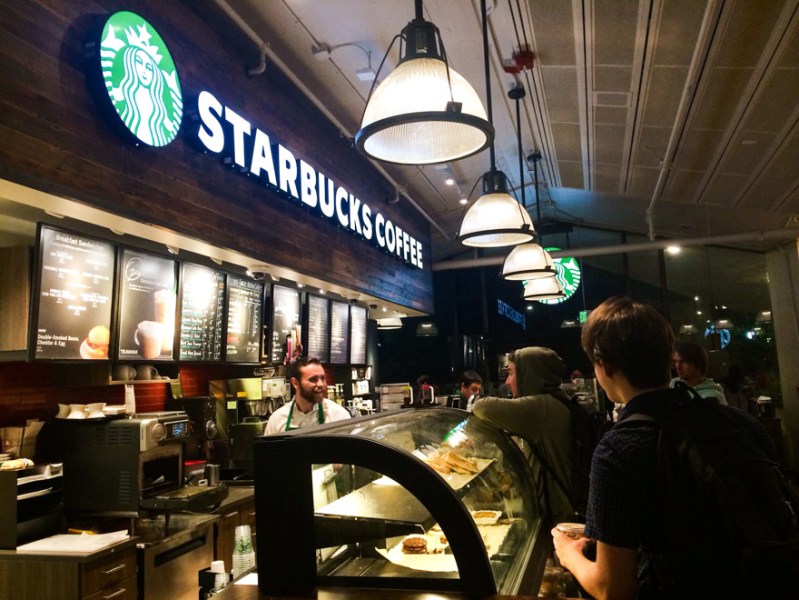Here are the things I’ve seen in the Stanford Starbucks: a wizened man in a yarmulke and embroidered robes reading a wrinkled paperback; a blond woman who wore black sunglasses inside and stared at the floor for hours; a gaggle of tourists clutching unicorn Frappuccinos while frustrated professors who just wanted their simple coffees waited behind them; a plethora of college students hunched over their laptops, sipping away on cold brews as they worked…
Once I was sitting in Starbucks, contentedly reading my Russian history homework, when I overheard this conversation:
A group of three girls are chattering over steaming cups of white mocha lattes.
“So you know how I had to print out, like, three hundred billion pages for our meeting?” A grinning blond girl took a big gulp of her coffee and winced as it burned her mouth.
“It’s so extra, OMG,” smiled her friend.
“Yeah, so I printed it out at work, but the printer is, like, right next to my boss’s desk? And then the printer ran out of paper? But I didn’t know where it was, so I had to ask my boss, and he didn’t know? And then I spent an hour running around for paper.” Another dramatic gulp of coffee. “And then it ran out of toner too? And my boss also didn’t know where that was? And then I needed a binder clip and he didn’t know where that was either?”
“Jesus, that’s embarrassing.”
“I know! And then he was like, what is all this for? And I told him it was for my sorority, and he was like, jeez, that’s more detailed than the documents they give us before starting at Google!”
All three girls chuckled.
As a writer, I’m always looking for entertaining stories. My creative writing homework is to observe the world around me and record my strangest observations. I’ve recorded outlandish conversations and weirder people. Most of these observations are harmless, besides the occasional “WTF that person is so weird!” thought that makes it into my notebook.
Still, it feels a little bit like an invasion of privacy. There’s a swarm of issues surrounding observational writing. First, how much of it is truthful? If you’re observing the real world to create scenarios in fiction, it’s not much of a problem — there’s no expectation that anything you read actually happened. If you’re observing for a news story, or a creative nonfiction piece, however, some of your own interpretations will color your rendition of it. The conversation I recorded above was recorded from memory, and though many of the details are the same, it’s certainly not word for word what was said. You’ve all played the game of Telephone before, right? A story loses accuracy once it’s retold over and over again.
If you’re still thinking I’m making a mountain out of a molehill, then check out this story. In 2011, a couple broke up in a Burger King. Barring the unfortunate restaurant locale (who eats at a Burger King anymore?), the event is significant because the entire breakup was live tweeted by a journalist — and went viral. Maybe it’s because it was just so American to dissolve a relationship in a greasy fast food joint reeking of industrial cleaner and soggy french fries, but the internet devoured the conversation. It spawned articles like “It’s not safe to break up in a Burger King anymore.”
Which to me raises the question: Is it morally justifiable to record someone’s overheard conversation for the merriment of the general public?
From my understanding, legally, it is entirely ethical. If you’re going to break up in public, be prepared for it to end up on the internet the next day. It’s the same thing as taking Snapchats or sending emails or whatever — don’t put anything in writing or anything in a photograph unless you’re prepared for the entire world to see it. That’s the idea, right?
But morally … there are so many complications. Journalists and writers hover constantly between being observers and participators. To truly objectively record something, we’re not supposed to be involved in it. We shouldn’t write about our own clubs; we shouldn’t interview our own friends — which makes sense for obvious reasons.
But sometimes remaining as a mere observer can bring about so many complications. It can mean an invasion of someone’s privacy — or even a bystander in an act of violence. For example, recently I read an article about photography in National Geographic for my Thinking Matters class. A section of the article discussed photographs during war, and a photograph was shown of distraught villagers. This photo was taken, read the caption, minutes before their execution.
How could anyone just stand by and let innocent civilians get slaughtered? I know, I know, I’m incredibly naïve — trust me, people have been telling me that for years. But seriously, I don’t understand how photographers and journalists can enter areas of war or immense poverty and just watch people suffer. Should helping people survive be more important than documenting it for the media?
Obviously, overhearing a few innocent conversations in a Starbucks is a pretty mild example in comparison to photographing victims heading off to their execution. But as technology expands, it becomes easier to document conversations that are intended to be private. Think about it: Ten years ago, before Twitter had taken off, there really would have been no platform for that Burger King Breakup to be recorded. Today, it can be tweeted about, added to a Snap Story, put on Facebook Live, put on an Instagram Story, or whatever other form of social media has been spawned.
Do we document it all? Or is there a line to be drawn somewhere?
Contact Caroline Dunn at cwdunn98 ‘at’ stanford.edu.
